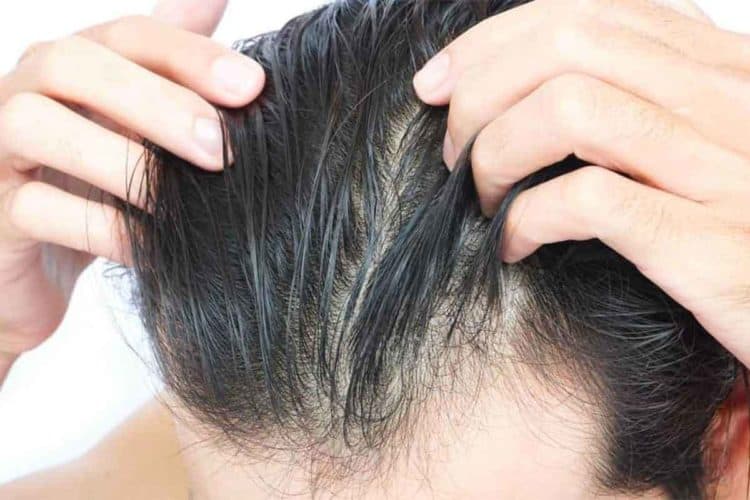Think you have hair loss related to stress? Are you finding yourself shedding strands more than usual and concerned stress might be a factor? You’re not alone if you’re feeling that your hair is thinning because of daily pressures.
Yes, stress can greatly affect hair loss. Scientists have discovered the stress hormone cortisol may be responsible for your sudden hair loss problems. One study by J Drugs Dermatol found that cortisol affects hair follicles adversely, especially when the hormone is present at higher levels.
While rising stress problems can create hair loss patterns, it may also be from other genetic factors and even your diet. Both men and women have issues with stress-related hair loss. Here are some reasons you may be shedding and how to reduce your stress today – read on.
Stress Related Hair Loss Problems
If you feel like your hair is just not as thick as it was before the divorce or that big annual meeting coming up, you aren’t alone. Scientists have found that there are three common conditions related to stress and hair loss.
1. Telogen Effluvium
Those who suffer from the disease telogen effluvium are definitely going through chronic stress. This can be brought on through a recent stressful event or an ongoing issue that continuously drives up your cortisol levels. Poor diets can also cause this type of hair loss.
Symptoms
- Thinning hair all over
- Shedding large clumps of hair
- Weak follicles, dull, brittle hair
- Bald patches
- Dandruff or dry scalp
Telogen effluvium occurs when there’s a shock to your system, causing your hair to thin and shed. Hair follicles enter the telogen phase prematurely due to this type of stress. During this phase, your hair doesn’t actively grow and eventually weakens as your stress gets worse. Ultimately, your hair shedding may continue until stress or diet problems are fixed.
Diet issues mainly relate to lack of certain vitamins in your diet, such as vitamin A, biotin, niacin or vitamin B3, and vitamin C. In addition, minerals like zinc and iron help with your hair’s strength as well.
If you feel like your diet is causing problems, you may want to get a blood test to test your levels. You could be anemic or dealing with other deficiencies.
See the Best Foods for Hair Growth
2. Alopecia Areata
Anxiety and depression are two forms of stress that occur with this condition. Known as alopecia areata, hair typically sheds in separate circular patches if you have this problem.
Symptoms
- Hair falling out (shedding)
- Round patches of missing hair
What’s happening? Your immune system attacks your hair follicles and killing them, leading to dead follicles and no hair growth. This condition becomes progressively worse as stress levels rise and may end up with complete baldness if not treated properly. You can visit your doctor and request a blood test if you feel this might be your issue.
3. Trichotillomania
So stressed you could pull out your hair? You may have this impulse control disorder called trichotillomania that’s known for people pulling out their hair when under stressful conditions. You may have the urge to pull hair from your head, eyebrows, or other areas of your body.
Symptoms
- Triggers cause you to pull out hair
- Hair pulling from head, eyebrows, and other areas of the body
This condition is mostly linked to anxiety and obsessive-compulsive disorders. You may want to seek out a therapist to see how to control this behavior and identify your triggers.
Stress Does Not Cause Male Pattern Baldness
Even if you have stress, you can typically get your hair to come back by taking care of your body and working with a doctor to reduce issues with your diet or other deficiencies. If you have male pattern baldness, however, then you may be experiencing hair loss due to genetic factors and a hormone known as DHT.

Unfortunately, reducing stress won’t help you regrow hair if you have male pattern hair loss. Don’t despair! You can take control of your hair loss and own the bald look.
How to Prevent Stress Hair Loss
If you think you have a condition or just want to rule it out, then you should visit your doctor and get a blood test right away. You could have some deficiencies in your diet that are causing your body to stress out and increase cortisol levels.
There are a few things that doctors suggest you do if you know your stress levels are very high simply because of lifestyle and diet factors. The first thing you have to do is reflect on current stressors in your life and acknowledge problems that are daily stressors for you.
Many people feel stress from a lack of knowing how to fix problems they don’t address. Hair loss is probably a cause of stress, but are there any other factors? Perhaps it’s a problem at work, an issue with your relationship, overall feelings of anxiety, or a general dislike of your lifestyle. Doctors say the best way to root out these stressors is to take an active role in what’s bothering you and removing it from your life in any way possible.
Quick Stress Relief Right Now
Finding balance in your life starts with good stress, managing and doing so consistently.
- Have a seat somewhere quiet and take a deep breath.Imagine all the problems being released out of you when you breathe out. Do this for several minutes, never focusing on the problems longer than it takes to breathe them out.
- Stretch it out.Doctors say that even stretching for 60 seconds can loosen you up and get blood flowing through your body so you feel warm and energetic.
- Take 20 minutes to exercise.It only takes this small amount of effort to start. You can do jumping jacks, situps, crunches, lunges, wall sits, or a quick walk or jog to start off.
- Take care of yourself.Eat something that your body will love today, like pumpkin seeds, bananas, beets, spinach, kale, strawberries, salmon, oranges, mangos, carrots, or apples. These fruits and vegetables are known to help the body with vitamins and minerals for hair growth.
- Monitor your brain’s thoughts more closely.Identify what’s bothering you the most in your life and plan out steps to tackle the problem. These should be achievable steps that will assuage your mind because you’re taking action.
- Stay hydrated.Be sure to consume fluids at regular intervals throughout the day.
- Meditate every day.Meditation is a good way to clear out your brain, press reset, and prepare yourself for what you have to do today. There are all kinds of meditations you can do for self-care, sleep, motivation, focus, and stress.
In addition, you may want to look into products that won’t stress out your hair, such as hair loss shampoos without sulfates, anti-dandruff zinc shampoos, and moisturizing shampoos. These should you get rid of dry scalp, which could be stressing out your hair follicles when you scratch.


